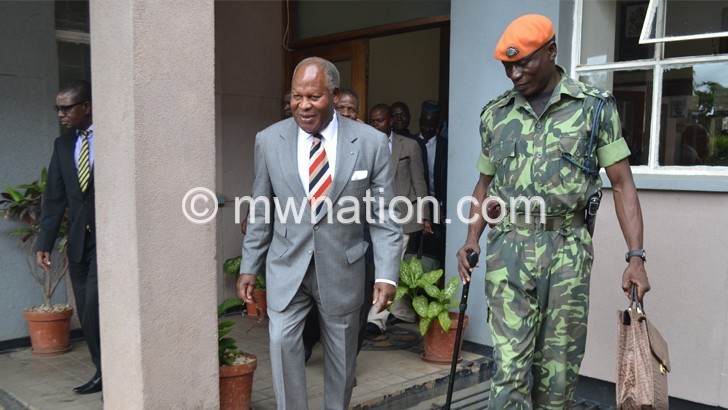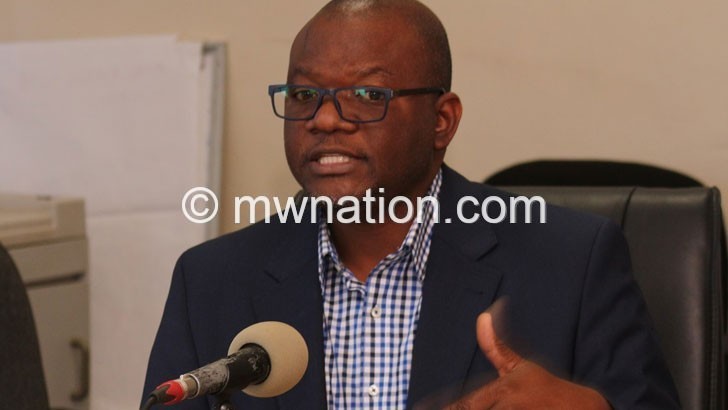Muluzi case needs political solution—ACB boss
The corruption case against former president Bakili Muluzi now enters its 14th year and ACB director general Reyneck Matemba believes the case needs a political solution because it is not prosecutable.
Matemba, who once prosecuted Muluzi before he recused himself in the case when he was Anti-Corruption Bureau (ACB) deputy director general, holds the strong personal view that no one would come at the bureau and successfully prosecute Muluzi in the case that is clocking about 14 years.

Actually, all presidents that came after Muluzi, the late Bingu wa Mutharika, Joyce Banda and the incumbent Peter Mutharika, have seen the now 78-year-old being involved in endless court battles in the matter.
The ACB boss said in an interview last Wednesday that when he was prosecuting the case it reached a point where he could see that it was not going anywhere.
“I was the seventh person to prosecute that case; it doesn’t mean we’re all failures and did not know our work. I had my own reasons why I recused myself from that case, which I only provided to the previous Legal Affairs Committee of Parliament.

“I repeat that case requires political solution backed by the law. All relevant stakeholders must be involved, that’s the ACB, Director of Public Prosecutions [DPP], the court and Parliament through Legal Affairs Committee,” Matemba suggested.
He disclosed it became difficult for him to continue prosecuting the case, and he felt there was no future for the case because of what he was experiencing, leading to his recusal.
Pressed to disclose the challenges about the case, Matemba insisted he only did that to the previous Legal Affairs Committee and he would do the same to the current committee when granted the audience.
Previous Legal Affairs Committee of Parliament chairperson Maxwell Thyolera said in an interview on Saturday that he only recalls that when Matemba appeared before the committee to update it on Muluzi’s and other cases, he complained about delaying tactics Muluzi’s defence lawyers were allegedly deploying.
Thyolera explained that Matemba complained that every time the matter lawyers would come up with certain applications, some on technicalities, including where Muluzi wanted interpretation of some sections in the Corrupt Practices Act by the Constitutional Court. was coming to court, defence
The former chairperson said other challenges Matemba raised were to do with poor funding.
“He complained the bureau could be allocated funds in the national budget, but to access that was a challenge, thereby crippling their operations,” Thyolera said.
One of Muluzi’s lawyers, David Kanyenda, said he needed to consult the former president on claims raised.
Years on, the ACB boss, day-in day-out, watches his officers spending long hours in office preparing for the case, burning taxpayers’ money on fuel and allowances as they travel from their bases to Blantyre to prosecute the case, and yet he painfully knows what lies behind the case and that the efforts of his officers are in vain.
Asked directly what he feels when he watches his officers spending their precious time on something he feels won’t yield anything, Matemba responded: “I believe we’ve to be prudent in the manner we handle our limited resources, that’s the whole reason I’m expressing my personal view that this case requires political solution.”
He disclosed the previous Legal Affairs Committee knew his view about the future of that case and he would also empty his chest to the current Legal Affairs Committee.
“I intend to tell the committee about my personal view on the case and why I feel it requires a political solution. I will even provide them with reasons why I had to recuse myself from the case.
“My only dilemma now is this Democratic Progressive Party [DPP] and United Democratic Front (UDF) alliance [deal just entered]. I held and expressed this personal view earlier in January. But if I raise it now, the picture that will come out is that I’ve received instructions or I’m under pressure to do so, of course I cannot blame them, Malawians would be justified to think so,” Matemba said.
He explained that the reason behind his insistence that the case requires a political solution backed by the law is that ACB does not discontinue cases without legal reasons, for example lack of evidence, because that leaves room for lawsuits accused persons usually bring based on either malicious prosecution, false imprisonment or loss of business.
The ACB director general said there are legal procedures that guide the process to have a case discontinued, explaining that the bureau writes to the DPP, providing legal reasons as to why it wants a particular case discontinued.
“If the Director of Public Prosecutions is satisfied, a certificate of discontinuance is issued. Once the DPP does that, he/she writes a report to Legal Affairs Committee of Parliament,” Matemba explained.
He emphasised that it is not possible for the ACB or the DPP to discontinue a case without engaging one another or without Legal Affairs Committee involvement.
Matemba said when the Legal Affairs Committee grants him audience, he would be open and realistic with them because the delay of Muluzi’s corruption case has nothing to do with him.
“We can’t continue like that, let’s stop pretending, there’s something to do with that case. I’ll be leaving the bureau shortly, for how long are we going to operate like that?
“Time has come for us to reflect on this, if we don’t, different director generals may come and go, but this case will remain there, it can even last 20 years,” Matemba challenged.
Legal Affairs Committee chairperson Kezzie Msukwa said in response to a questionnaire that he would comment competently when his committee gets the letter from the ACB seeking the audience.
“Until I see the grounds on which ACB says that, there is nothing I can say particularly as it comes at a time when Dr Muluzi’s son has just gone into a bed with the governing DPP.
Msukwa said there are several corruption cases before the courts and hoped that the route the ACB boss wants to take would not set a bad precedent.
Professor of law at Chancellor, College Garton Kamchedzera, said in an interview on Wednesday there are laid down legal procedures when authorities decide to discontinue a case, as Matemba correctly explained.
He said all these processes, for example involving Parliament, were put as a means of providing checks and balances.
“The ACB director general may decide to do this now, but he is in a very difficult situation when one thinks of the recently announced alliance between the governing DPP and UDF, people will say those in power are rewarding UDF.
“But he shouldn’t mind this, if he’s convinced and has legal reasons to discontinue the case, he can proceed as long as he does everything according to the law and do his work professionally,” Kamchedzera said.
ACB directors that have overseen Muluzi’s case
- 2004 to 2006: Gustav Kaliwo, resigned shortly after he arrested Muluzi
- 2006 to 2007: The late Tumalisye Ndovi, rejected by Public Appointments Committee (PAC) of Parliament
- 2007 to 2012: Alex Nampota, re-engaged after he previously deputised the first ever ACB boss, Gilton Chiwaula in late 1990s
- 2012 to 2014: Justice Rezine Mzikamanda, returned to Judiciary, Malawi Supreme Court of Appeal
- 2014 to 2017: Lucas Kondowe, left after his three-year long contract expired
- 2017 to date: ACB acting boss and later director general Reyneck Matemba





